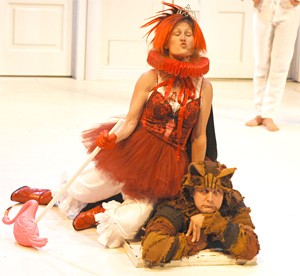While some look back on childhood as a carefree time when jobs, taxes, and cellulite were meaningless terms, there are sufficient horrors in anyone's formative years to fuel a year's worth of plays. And that may explain why many artists are drawn to Lewis Carroll's fanciful but deeply curious writing — including Matthew Earnest, who is in charge of Alice . . ., now at the Porthouse Theatre.
In his adaptation-with-music of Alice's Adventures in Wonderland and Through the Looking-Glass, this inspired director has pared the ridiculous and illogical events that Alice experiences down to their basics. Using a stark and monochromatic white set as a backdrop, Earnest puts an imaginative and largely excellent cast through their fantastical paces.
But by trying to cover too much territory, Earnest's fragile excursion lumbers on for more than two and a half hours. And that's enough to prompt many audience members, and virtually all parents with children in tow, to mutter, "Off with his head!"
The first act is a fresh and consistently delightful take on the well-known Alice in Wonderland material. By making everything small and simple — Alice's fall through the rabbit hole is rendered by cast members tossing various objects up and down in front of her face as she is held aloft — Earnest deftly captures the childlike amazement at the heart of Carroll's classic tale.
Indeed, there is so much nonstop theatrical invention taking place, the staging threatens to swamp the storyline. But it never does, as Alice tries resolutely to resolve her issues of growth, always seeming too big or too small for the situation at hand, while adults persist in presenting her with the most puzzling and insoluble challenges.
In the second act, however, the action that occurs "through the looking glass" begins to feel familiar and rehashed. Even a promising segment involving Tweedledum and Tweedledee falls flat, because the poem they recite is never given a clear (even a clearly irrational) context.
In the role of Alice, Emily Pote has the slight stature and wide-eyed innocence required, and her strong stage presence keeps this fractured fairy tale from jumping the tracks. All the other characters — and there are scads of them — are shared by 11 other actors who clearly understand and share the director's vision.
Standouts include Gabriel Riazi, who fashions a refreshingly unique Mad Hatter and a bitchy, drag-queen Tiger Lily, and Samantha Rosentrater, who delivers each of her roles with comic precision — especially her hilarious White Queen ("There is jam yesterday and jam tomorrow, but never jam today!"). Nick Koesters adds a rakish dash to a too-brief encounter as the Cheshire Cat.
Heather Lea Anderson Boll is perfectly uptight as the older Alice, but she seems overly predictable as the bat-shit-crazy Queen of Hearts, a role where many more chances could be taken to explore a child's worst nightmare. And although Shawn Parr finally loosens up a bit as Humpty Dumpty, his woodenness in other roles lands with a thud.
Much of the show's charm is due to some engaging songs composed by Joseph Troski, who also supplies keyboard and vocals. Although overly long, Alice . . . is a royal feast for the imagination.


